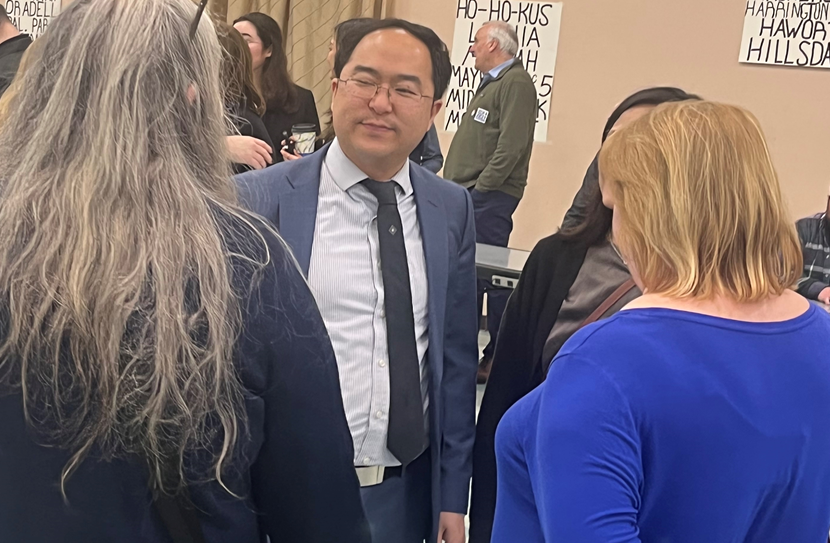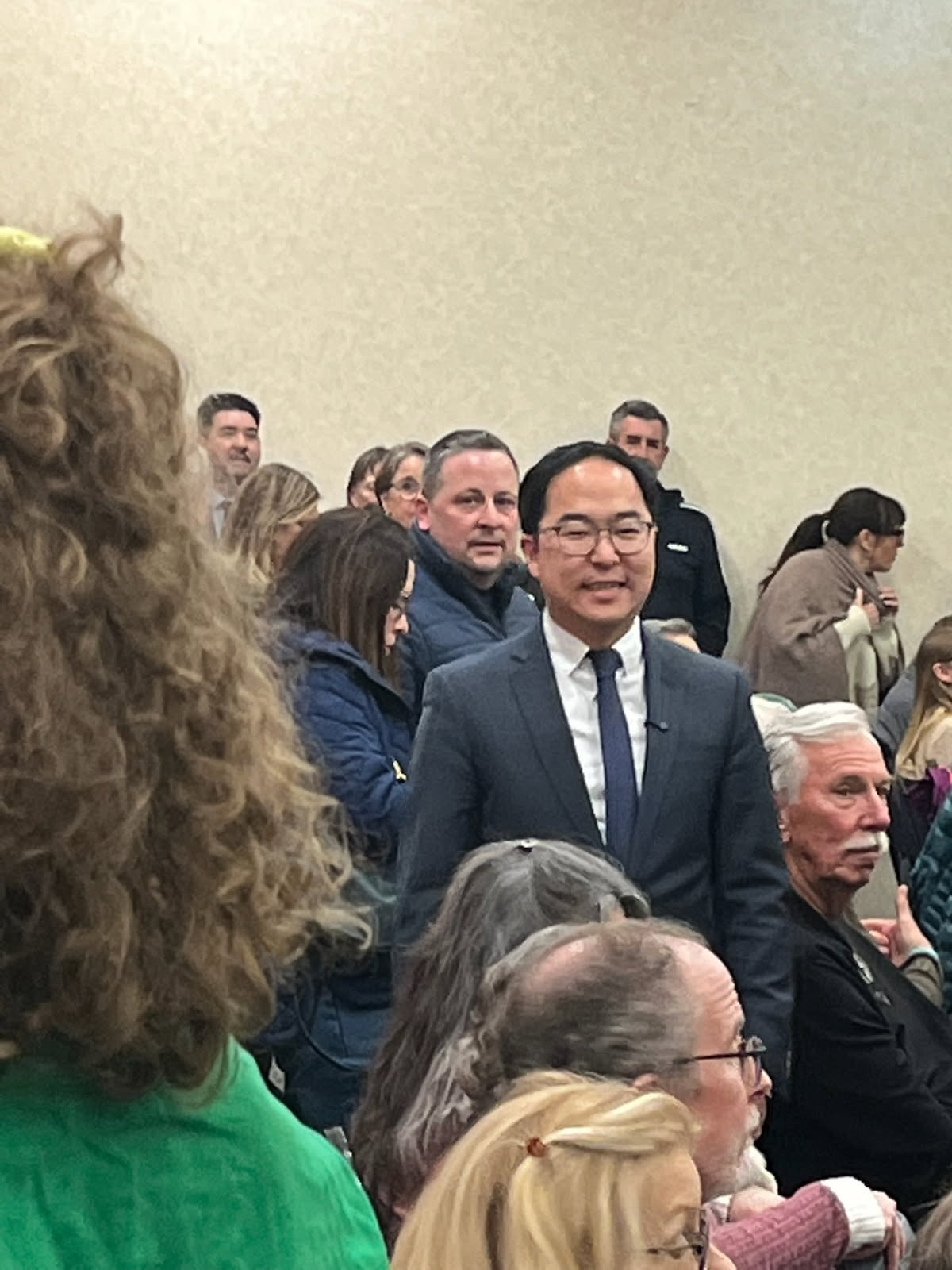
As U.S. Rep. Andy Kim sought to win over more Bergen County voters at a recent appearance, one supporter, a self-identified Cuban-Black American, said he wanted to know what Kim had done to improve the lives of people like him. A Bergen County resident giving his name only as Carlos, he sported an Andy Kim button on his jacket and listened intently during Kim’s meet-and-greet.
The event, which took place in Ridgewood, was not so much of a policy-oriented gathering, where he would attempt to define his positions on specific issues, but rather as a personal, introductory session where the largely Caucasian and Asian audience would have an opportunity to learn about the South Jersey congressman directly.
After Kim’s talk, Carlos had an opportunity to speak with the congressman. “In the years you were in Congress, what have you been able to do for the Black and Hispanic community?”
“We’ve been trying to prioritize economic opportunities,” Kim said. “I’ve worked on the Small Business Committee and done a lot to be able to push to make sure that we have support and access capital for black and brown-owned businesses, minority-owned businesses, and immigrant-owned businesses.”
The congressman added, “We’ve been fighting hard to try to get across the line the Justice and Policing Act which would have the police reforms that I believe that our country needs in different ways. I’ve been pushing forward on a lot of immigration-related efforts to try to have a comprehensive immigration reform effort, while also making sure we’re moving forward on DACA Dreamers. Passing the Dream and Promise Act to give a pathway forward is a step in that direction.”
Carlos told InsiderNJ that he did not agree with all of the Congressman’s positions, but said “he has conviction.” His family fled from Communism in Cuba and made their lives in New Jersey. When he saw Cuban-American US Senator Robert Menendez indicted—again—he said “It broke my heart,” and that Cubans like him were deeply disappointed.
Kim is also the son of immigrants. He explained during his rally that his family had come over from South Korea, having endured exceptionally difficult circumstances before being able to come to the US. His parents were able to make good lives for themselves in New Jersey, obtain higher education, and Kim expressed his own gratitude for the country which allowed his family to thrive and achieve great things.
Nevertheless, as one son of immigrants seeks to displace another in the US Senate, First Lady Tammy Murphy’s appearance in the race has presented a unique situation in New Jersey where, for all intents and purposes, the party machinery has bowed before the governor’s power to give their blessing to his wife, who has never held office before. Kim has been able to successfully characterize himself as an underdog in the race, and he has performed well among Democratic voters, even as the majority of county chairs give their blessings to Murphy.
Walking the Line: A Potential Win-Win Scenario
The single item which has become like a lightning rod in what is ordinarily a less exciting US Senate Primary is the matter of “the line.” Congressman Kim has joined a lawsuit seeking to scrap the party policies of awarding a line, with County Clerks pushing back that there’s too little time to change the ballot arrangements between a ruling and the primary election. The machine favors Murphy, as though the governor who spent his way into the state and flew past Kim Guadagno, narrowly squeaking a win against Ciattarelli later, keeps a tight grip on the Democratic Party reins.
With regards to the lawsuit, however, Kim has nothing to lose. Should the ruling go favorably and the uniquely New Jersey party line system, which is in place in most NJ counties, be abolished, then Kim will be able to celebrate a victory for fairness and openness. Such an outcome would appear to be beneficial for him, but also future candidates who do not necessarily have the favor of the party kingpins.
Chairs who defend the party line system regard it as a kind of quality vetting process. However, the insulting phenomenon of “banishment to ballot Siberia” also exists, where a theoretical long-shot candidacy is placed somewhere obnoxiously far down on the ballot, ostensibly away from a voter’s first glance, and, psychologically, reinforcing the notion that that individual has no chance.
If Kim should lose the lawsuit and the party line system remains intact—at least for now—then Kim can also enjoy political points by firing up his supporters, demonstrating that their voices really are being closed off by the party power players. This may impact some Democratic voters who are unenthusiastic about Murphy, but also unfamiliar or otherwise not sold yet on Kim.
Man vs. Machine?
Insider NJ asked Andy Kim if he could describe his current standing with the Democratic Party, seeing as he is leading an insurgent effort against the party apparatus.
“I think a lot of people want this [campaign],” Kim said, “and I think what I’m doing is actually completely in line with the Democratic Party. It’s in line with a lot of the rank-and-file Democrats that I have talked to, thousands of lives that we’ve engaged, in what I’m trying to do. It’s in line with what the President is trying to do in terms of protecting our democracy. We are a party that’s about trying to stay true to our values of integrity in public service. So, what I’ve been doing is, I think, trying to actually move New Jersey more in line with what the Democratic Party can be, and should be standard.”
When asked if he felt the Democratic Party itself was behaving in an anti-democratic manner, he replied, “I think what they’re doing right now with the Senate race is undemocratic. They are not letting it be a fair choice. Fairness and equality are at the center point of our democracy. I think that that’s something that is being weaponized right now. That is not in line with what I believe our democracy is.”
Although the congressman has made a strong case on the perceived unfairness of the county line system a central part of his campaigning, he has done well for himself regardless. A Kim defeat of Murphy in the primary would send a shockwave through the Democratic Party and, perhaps, initiate some serious soul-searching to see how connected with voters the party is, as opposed to how attuned it believes itself to be.
The Wave Breaks
Despite Murphy’s institutional advantage, Kim has successfully outperformed Murphy among Democrats in Monmouth, Burlington, Hunterdon, Sussex, and Warren Counties. These are not huge Democratic strongholds, however, in otherwise very Republican counties. Murphy secured a significant win Monday by taking the Bergen County Democratic Convention. The outcome in Bergen, with its large population, offers a sigh of relief for the former Republican First Lady. Chairman Paul Juliano positioned himself behind Mrs. Murphy and the Bergen convention went with nearly two-thirds voting for her, putting the brakes on Kim’s winning streak for now.
The race, of course, is far from over, and the US Senate Primary of 2024 may be remembered for some time as one of the more exciting and unquestionably historic primary elections. The stage is set against a backdrop of the implosion of Menendez’s long reign. From these Hudson County based ashes would emerge the state’s first female US Senator—simultaneously creating a new Garden State political dynasty borne out of Needham, Massachusetts, and Virginia Beach, planted in Goldman Sachs soil—or a South Jersey rising star and the East Coast’s first Korean-American US Senator. The Republican challenger, likely to be Christine Serrano Glassner, would also become the state’s first female US Senator if she triumphs in November. A Glassner victory would represent another milestone—the first Republican elected to the US Senate since 1972. Whatever the final outcome in November is, 2024 will mark a unique and exceptional result for New Jersey.
(Visited 40 times, 40 visits today)
The US Senate race is heating up as candidates from both parties vie for the coveted seat. While the outcome of the race is still uncertain, there are some potential historic outcomes that could result regardless of who emerges victorious.
One potential historic outcome is the election of a candidate from a historically marginalized group. In recent years, there has been a push for more diversity in politics, with a focus on electing candidates who represent a wider range of backgrounds and experiences. If a candidate from a marginalized group were to win the Senate race, it would be a significant milestone in the ongoing fight for representation and equality in government.
Another potential historic outcome is the election of a candidate who breaks with traditional party lines. In today’s polarized political climate, it is rare to see candidates who are willing to work across party lines and prioritize the needs of their constituents over party loyalty. If a candidate were to win the Senate race by running as an independent or by appealing to voters from both parties, it could signal a shift towards a more collaborative and inclusive political landscape.
Regardless of who wins the US Senate race, there are sure to be historic outcomes that will shape the future of American politics. As voters head to the polls, they have the opportunity to make their voices heard and potentially pave the way for a more diverse, inclusive, and collaborative government.



